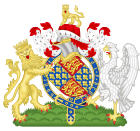Statute of the Staple facts for kids

|
|
| Citation | 27 Edw. 3 Stat. 2 |
|---|---|
| Territorial extent | England |
| Dates | |
| Royal assent | 1353 |
| Other legislation | |
| Relates to |
|
| Text of statute as originally enacted | |
The Statute of the Staple was an important law made in October 1353. It was created to organize trade better in England, Wales, and Ireland. This law chose specific towns and ports where certain goods could be bought and sold. These places were called 'staple ports'. The law also set up special courts, known as the courts of staple. These courts handled arguments about business deals instead of the usual courts.
Contents
What Was the Statute of the Staple?
This new law helped make trade fairer and more organized. Before this, there were discussions in 1352 and 1353 about how to manage these 'staple' towns. King Edward III's officials were ready to start the plan by July 1353. The Parliament officially approved this new system in 1354.
A previous law in 1326 had already defined what staple towns were. But the 1353 Statute made their trading rights much wider. It also made it easier for merchants to get credit, which helped trade grow. This was important because the Black Death had caused big economic problems. The law helped make sure there was enough money moving around in the economy.
Where Were the Staple Towns?
The Statute of the Staple named several towns as official 'staple' locations. These were places where important goods like wool could be traded.
Staple Towns in England
- Newcastle upon Tyne
- York
- Lincoln
- Norwich
- Westminster
- Canterbury
- Chichester
- Winchester
- Exeter
- Bristol
Staple Towns in Ireland and Wales
- In Ireland: Dublin, Waterford, Cork, and Drogheda
- In Wales: Carmarthen
Later, in 1368, the main place for trading wool moved from Canterbury to Queenborough in Kent.
How the Statute Changed Trade
In 1363, merchants from York and Bristol set up a new staple in Calais, a town in France that was controlled by England at the time. These merchants had a very strong hold on the wool trade. They were even banned from exporting wool to England in 1353.
To deal with this, the merchant groups from York and Bristol worked with the English King. They decided to create a new market for wool in Bruges, a city in Flanders (modern-day Belgium). They kept asking Parliament to allow "free trade" of cloth to Flanders. This was a good time for them because the last big trading company in Bruges had gone bankrupt in 1351.
King Edward III wanted to be friends with Hainault (where his queen was from). He hoped for a strong partnership against France. The people in Parliament liked the King's idea and agreed to move the trading rights to Bruges. The Black Death had reduced the number of workers, which made people more aware of the need to control trade and prevent cheating. This also meant England could collect taxes on goods at certain ports. The Chief Justice even said that free trade was good for everyone and for the law itself.
See also
- The Staple, to learn more about the medieval meaning of the term
- Chapter 10, which dealt with cheating in measurements
 | Isaac Myers |
 | D. Hamilton Jackson |
 | A. Philip Randolph |

